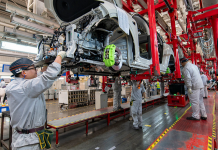BEIJING: The city of Shanghai is where the Communist Party of China (CPC) first embarked on its 100-year-long voyage.
The Memorial for the Site of the First National Congress of the CPC in Shanghai, and the replica of the red boat, where the meeting announcing the founding of the CPC was concluded on Nanhu Lake of Zhejiang Province, serve as a reminder of the leadership, vision and persistence demonstrated by the Party in leading the Chinese people to achieve national rejuvenation over the past 100 years, Leandro Compagnucci, deputy head of the Argentina Embassy mission in China, told Beijing Review after a visit to the two sites on July 19.
The celebrations of the CPC centenary, a major event in the political life of the Party and the nation by large, have provided an opportunity for the world to deepen its understanding of the CPC, Jin Xin, Director of the China Center for Contemporary World Studies under the International Department of the CPC Central Committee, said at an international academic conference on CPC governance, which took place at Fudan University in Shanghai on July 20.
Some in the international community try to analyze and interpret the CPC from the perspectives of theoretical innovation and practical exploration. Furthermore, according to Jin, the world has also shifted its attention from doubting whether the CPC and the socialist system are sustainable to exploring why and how the CPC actually works in China. Born at a critical time when the Chinese people were fighting for national independence and individual liberation, and trying to establish a new society with a new culture, the Party has shown great resilience in extremely difficult times and succeeded in profoundly changing Chinese society, Saikhansanaa Khurelbaatar, Advisor to the Secretary General of the Mongolian People’s Party, said in her video address to the conference.
The CPC has transformed a forgotten, subordinated and absolutely peripheral country into one of the world’s main economic powers, one of the most technologically advanced countries on the planet and a country that puts all its economic power at the service of the prosperity of its people, Compagnucci added at the opening ceremony of the conference. The Center for Economics and Business Research, a British think tank, predicted that China will surpass the U.S. to becoming the world’s largest economy in 2028 in a report released at the end of last year. Actually, according to a report by the World Bank in May 2020, China’s GDP in terms of purchasing power parity surpassed that of the U.S. in 2017 to become the leading one in the world.
Yang Fengcheng, a professor at the Renmin University of China in Beijing, said that one of the successful experiences of the CPC’s national governance is to scientifically study and assess historical trends and in timely manner introduce medium- and long-term strategies to promote economic and social progress. His views were echoed by Compagnucci, saying that the Party is able to achieve a continuous growth of the economy, the stability of a society that can live in harmony, and a peaceful rise on the international stage that gives hope to all those that believe in multilateralism and dialogue more than in international coercion.
– The Daily Mail-Beijing Review News exchange item






